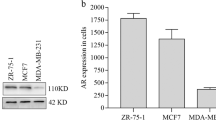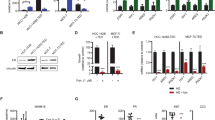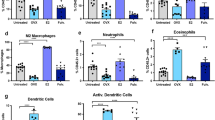Abstract
We have investigated the effects on breast cancer cell growth of 4-hydroxytamoxifen (4OHT), a conventional antioestrogen with agonist activity, and 7 alpha-[9-(4,4,5,5,5-pentafluoropentylsulphinyl)nonyl]oestra- 1,3,5,(10)- triene-3,17 beta-diol (ICI 182780), a novel, pure antioestrogen, using established human breast cancer cell lines and cancer cells obtained directly from breast cancer patients with malignant pleural effusions who had relapsed on tamoxifen. The effects of the two agents were assessed using the Courtenay-Mills clonogenic assay, which measures the growth of single cancer cells as colonies suspended in soft agar. The standard assay was modified by the use of defined serum- and phenol red-free growth medium. The growth of oestrogen receptor (ER)-positive MCF-7 cells in the assay was oestrogen responsive. Both antioestrogens inhibited the stimulatory effects of 1 nM oestradiol, but ICI 182780 caused significantly greater inhibition than 4OHT at 0.1-1.0 microM concentrations. In the absence of oestradiol, 4OHT but not ICI 182780 caused significant stimulation of colony formation at low (0.01-1.00 nM) concentrations. Neither antioestrogen had any effects on colony formation by the ER-negative Hs578T cell line. Successful colony formation was obtained in primary cultures from six out of eight malignant effusions. Colony formation was significantly stimulated by 0.1 nM oestradiol in four cases and by 10 nM 40HT in two cases. In contrast, ICI 182780 exhibited no intrinsic stimulatory activity and significantly inhibited both oestradiol- and 4OHT-stimulated cell growth. We conclude that the agonist activity of 4OHT and other conventional antioestrogens may cause treatment failure in some patients by stimulating breast cancer cell growth. The new, pure antioestrogen ICI 182780 is a more potent oestrogen antagonist than 4OHT and exhibits no growth-stimulatory activity. This agent may therefore offer therapeutic advantages over conventional antioestrogens in patients with advanced breast cancer and may be effective after conventional agents have failed.
This is a preview of subscription content, access via your institution
Access options
Subscribe to this journal
Receive 24 print issues and online access
$259.00 per year
only $10.79 per issue
Buy this article
- Purchase on Springer Link
- Instant access to full article PDF
Prices may be subject to local taxes which are calculated during checkout
Similar content being viewed by others
Author information
Authors and Affiliations
Rights and permissions
About this article
Cite this article
DeFriend, D., Anderson, E., Bell, J. et al. Effects of 4-hydroxytamoxifen and a novel pure antioestrogen (ICI 182780) on the clonogenic growth of human breast cancer cells in vitro. Br J Cancer 70, 204–211 (1994). https://doi.org/10.1038/bjc.1994.281
Issue Date:
DOI: https://doi.org/10.1038/bjc.1994.281
This article is cited by
-
The efficacy of sequential second-line endocrine therapies (ETs) in postmenopausal estrogen receptor-positive and HER2-negative metastatic breast cancer patients with lower sensitivity to initial ETs
Breast Cancer (2020)
-
Fulvestrant: A Review in Advanced Breast Cancer Not Previously Treated with Endocrine Therapy
Drugs (2018)
-
A Detailed Mammosphere Assay Protocol for the Quantification of Breast Stem Cell Activity
Journal of Mammary Gland Biology and Neoplasia (2012)
-
Specific transcriptional response of four blockers of estrogen receptors on estradiol-modulated genes in the mouse mammary gland
Breast Cancer Research and Treatment (2012)
-
Proteasome inhibition represses ERα gene expression in ER+ cells: a new link between proteasome activity and estrogen signaling in breast cancer
Oncogene (2010)



